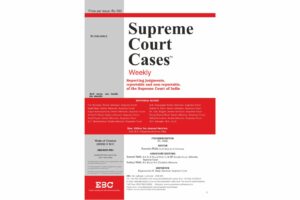Civil Procedure Code, 1908 — Or. 7 R. 11(d) and Or. 14 R. 2: Limitation as a ground for rejecting a plaint, when may be adjudicated on, as a preliminary issue, matter referred to a larger Bench. [Saranpal Kaur Anand v. Praduman Singh Chandhok, (2022) 8 SCC 401]
Consumer Protection Act, 2019 — S. 51 — Appeal to National Commission: Pre-deposit of 50% of amount as ordered by State Commission under second proviso to S. 51 is mandatory for entertainment of an appeal by National Commission. The object of the said pre-deposit condition is to avoid frivolous appeals. [Manohar Infrastructure & Constructions (P) Ltd. v. Sanjeev Kumar Sharma, (2022) 8 SCC 474]
Evidence Act, 1872 — S. 27 r/w Ss. 24 to 26 — Recovery evidence: Principles summarised regarding nature of S. 27, scope of admissibility under S. 27 and duty of prosecution and court in the matter. [Jafarudheen v. State of Kerala, (2022) 8 SCC 440]
Insolvency and Bankruptcy Code, 2016 — S. 7 — Admission of petition filed under S. 7 by financial creditor: Discretionary nature of power of NCLT to admit or not admit the petition filed under S. 7 by financial creditor, explained. Law clarified on factors which may be considered by NCLT in exercising this discretionary power. [Vidarbha Industries Power Ltd. v. Axis Bank Ltd., (2022) 8 SCC 352]
Insolvency and Bankruptcy Code, 2016 — Ss. 60(6) and 14 — Limitation period for filing application: Under the IBC, by virtue of the order admitting the application, be it under Ss. 7, 9 or 10, and by imposing moratorium, proceedings as are contemplated in S. 14 would be tabooed, but this does not include an application under S. 11(6) of the A&C Act, 1996 by the corporate debtor or for that matter, any other proceeding by the corporate debtor against another party. However, as far as understanding the meaning of S. 60(6) is concerned, there cannot be the slightest doubt that the period of moratorium is excluded even in the case of a suit or application brought by a corporate debtor viz. in regard to the period of the moratorium. [New Delhi Municipal Council v. Minosha (India) Ltd., (2022) 8 SCC 384]
Kerala Abkari Act, 1902 (1 of 1077 ME) — S. 8(1) r/w Ss. 8(2) and 55(g): In this case of illegal manufacturing of arrack, testimony of police officials was found reliable despite extensive cross-examination by the defence. Hence, claim made by the police that they apprehended the appellant while running from the spot and after taking him back to the spot, they seized the other incriminatory materials under a mahazar, held believable and, thus, conviction was affirmed. [Gopinathan v. State of Kerala, (2022) 8 SCC 486]
Motor Vehicles Act, 1988 — Ss. 166 and 168 — Permanent disability claim: In this case there was enhancement in compensation under heads “future loss of earning” and “attendant charges” by applying multiplier method in case of 100% permanent disability. [Abhimanyu Partap Singh v. Namita Sekhon, (2022) 8 SCC 489]
Service Law — Recruitment Process — Eligibility criteria/conditions: When remand is warranted, explained. Challenge to decisions of Selection Committee not examined by High Court on merits, whether proper, also determined. [Biju K.K. v. Cochin University of Science & Technology, (2022) 8 SCC 349]
Service Law — Termination of Service — Illegal/Invalid/Wrongful termination — Relief: Distinction between re-appointment and reinstatement, explained. [Central Bank of India v. Dragendra Singh Jadon, (2022) 8 SCC 378]

